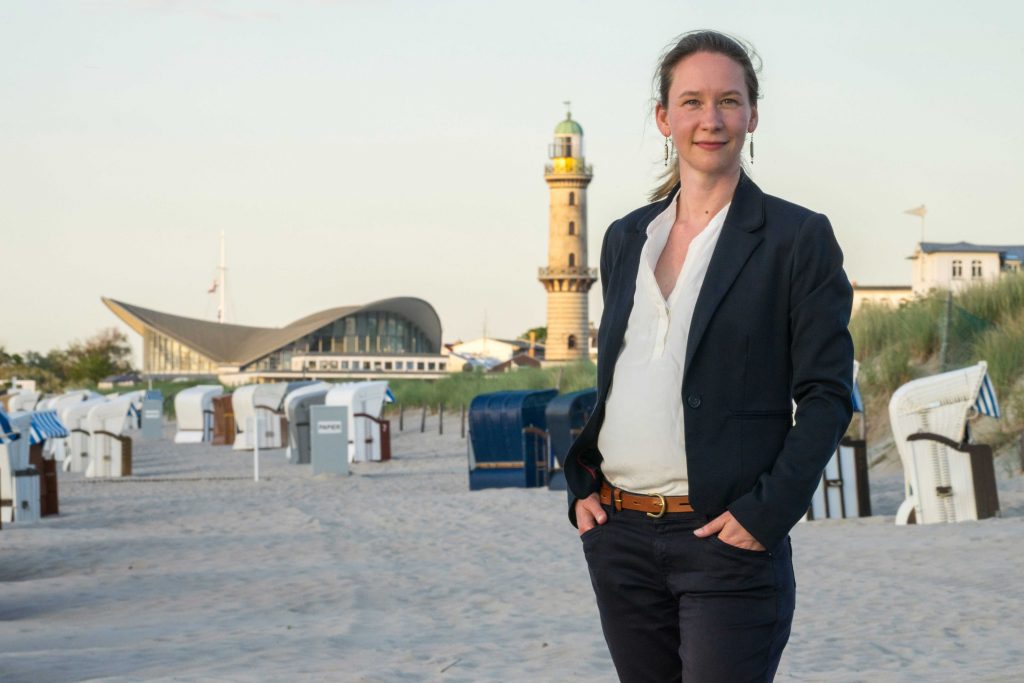Kerstin Schiele is a group leader of the marine planning group at the Institute for Baltic Sea Research Warnemünde (IOW). Kerstin studied Geoecology and ecosystem management in Germany and Australia and holds a PhD in marine biology. She benefits from her interdisciplinary background as a geoecologist as her research is at the interface between natural and social science.

Dr. Kerstin Schiele. Photo: Harald Viemann
What did inspire you to pursue a career in marine sciences?
Just like many people, I have always had a genuine interest in the marine environment. Anyway, a career in marine science did not seem accessible to me until my semester abroad at the University of Queensland, Australia.
Before, I had gained the perception that research is an ivory tower where students are not welcome and that you have to commit ALL your time to research, otherwise you cannot be successful.
At the University of Queensland, I took a course in ‘research in marine science’ that changed my perspective on what it means to be a scientist.
For that course, I had the opportunity to work on a small project directly with a PhD candidate. There was a flat hierarchy in the lab. Students, scientists, even professors were interacting at eye level. Surprisingly to me, all the researchers were nice, down-to-earth people who had a private life and simply enjoyed their work.
When I was close to completing my MSc degree, I was reading a very intriguing novel “The Swarm. A novel of the deep” by Frank Schätzing. It is about marine ecosystems and science and triggered my desire to choose research rather than ‘normal’ office work. I have to admit, I also spent most of my time in the office, but still it is a research environment.
What are the main things you enjoy about being a marine scientist?
I really like working on a topic that is interesting to me, to develop new ideas and concepts. In science, you need very diverse skills; it never gets boring.
I also enjoy international collaborations, including travelling and meeting fellow researchers. It is interesting to see how marine planning is organised in other countries and to learn from each other beyond research.
In general, marine science is something many people are curious about. A positive attitude is a real boost to share knowledge and to communicate scientific results.
What are your main professional achievements? Any/what obstacles?
After obtaining my PhD in marine biology, I changed my research focus to marine planning.
It has not always been easy to be accepted as an interdisciplinary scientist among scientists with a very strong record in a particular discipline.
Nevertheless, as project proposals were successful, I have been leading the marine planning working group at my institute for two years now.
Did you have any role models that led you to this career? How did they influence you?
My supervisor at my first PostDoc position. He introduced me to my current research topic, trusted my ability to perform well independently and did not hesitate to give me leadership responsibilities. With his positive attitude, he has always been a good example on how to handle challenges with ease.
Do you think there is a need for special support to retain women in science?
Yes, I think that special support is crucial towards the end of the PhD and directly after the PhD. Usually this is the time when career decisions are made. Personally, I believe that all PhD students would benefit from clear perspectives in that stage of their career. One way to achieve this could be for example a discussion with supervisors or other senior scientists. In my view, it is crucial to specifically target the career goals and personal circumstances of the individual and not only give general advise.
How can we overcome the issues driving women out of careers in marine science and technology?
Show them ways how it can work out in the long run early in their career. Fixed-term contracts after successful proposal writing is not attractive.
What advice would you give any women considering science as a career path?
Talk to others who already pursue this career. Find out for yourself if you really want this. If yes, seek advice early on. Be ready to work hard and not give up easily. Have a plan B.
What are the most effective way for you to maintain balance of your professional and personal life?
Friends, being outdoors and simple rules: stick to your appointments – both, professional and private.
This interview is very inspiring to read. Thank you! “The Swarm” by Frank Schätzing almost made me reconsider my career path as well. But in the end I stuck to my original one.